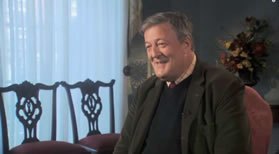By now, if you own a computer and have a reliable Internet connection (no mean feat in this wide brown land of the NBN) you’ve likely seen Stephen Fry’s fuck-you to god. If you’re one of those liberal atheists who favours pithy internet videos over books, is dismissive of anyone that tells you Sam Harris and Christopher Hitchens are most certainly not progressives, argues that Islamopobia is just neologism of the PC class and gets a kick out of calling yourself an anti-theist, then you were probably one of those people that shared it.
Asked to assume his disbelief is misplaced, what, Fry is asked, when confronted by god, would you say to him? With a chuckle, Fry steps from interviewee-mode into actor-mode, summons his inner most wrath and like a parent who’s just caught his son looking up porn on the website TubeV Sex Teen let’s fly with a suitably vexed response:
I think I’d say, ‘bone cancer in children? What’s that about? How dare you? How dare you create a world in which there is such misery that is not our fault? It’s not right. It’s utterly, utterly evil. Why should I respect a capricious, mean-minded, stupid god who creates a world which is so full of injustice and pain?’ That’s what I’d say.
All this anger is, of course, manufactured. How can he really be angry with someone he doesn’t even believe exists? Needless to say, this is an on-going problem for many atheists. Their solution is a predictable one: They just project that anger onto religious people. (I much prefer Bertrand Russell’s laconic response to the same question, by the way: ‘Not enough evidence, God! Not enough evidence!)
Fry has most often taken aim at various Christian denominations – usually the Anglican and Catholic Church – who consider him a miserable, irredeemable sinner for him homosexuality.
But Fry is in the minority when it comes to channeling one’s anger at the faithful: The Harris-Hitchens-Dawkins brigade – the ‘New Atheists’ or three of the ‘Four Horsemen’, if you will – make no secret of their belief that Islam is secular humanism’s Antichrist.
Religion, for these enlightened ‘Free Thinkers’, is the root of the problem: Religion is the greatest evil in the world today, or so the argument goes.
Theirs is a version of that nauseating, but oft repeated line of Western politicians, that ‘they’ hate ‘us’ because of ‘our’ freedoms. But the opposite is more accurate: ‘They’ hate ‘us’ because of ‘our’ lack of freedoms.
Take 9/11 as an arbitrary starting point (although one could pick any number of events back to the end of the Second World War) and ask what has been the greatest source of violence in the world? The US-led illegal invasion and occupation of Afghanistan and Iraq is the only answer any honest thinking person can give. But this is a fact seemingly ignored by the New Atheists – particularly Harris and Hitchens who were as supportive of these wars as any neoconservative and continued to promote the Bush government’s mission long after everyone but Tea Party nut-jobs had jumped ship.
The violence and destruction in the Middle East – embodied in the Islamic State and civil war in Syria – and the hope – captured in the Arab Spring – represent two sides of the same response to post-political world we live in.
Reporting from Cairo during the Arab Spring, long-time Middle East correspondent Robert Fisk observed that the people is Tahrir Square weren’t calling for democracy as many Western media organisations reported. Rather, they were calling for fairness, justice and dignity. For Arabs, Fisk explained, democracy is associated with America, who’ve done all that they can in the region to advance their own interests – their unwavering support for Saudi Arabia is just one example – even if it means repressing democratic movements in favour of tyrants.
In part, the protests were against the authoritarianism of their own regime, but they were also against Western intervention in their national affairs. More broadly, the Arab Spring should be seen as a bottom-up movement against the export of democracy by force (dare I call it neocolonialism?), Western support for totalitarianism in the region, growing inequality between the rich and poor exacerbated by the West’s neoliberal agenda, pervasive surveillance programs and drone terrorism.
The protests had an air of secularism to them; the people wanted more autonomy to decide the affairs of State and wanted that kept separate from the power and authority of the Church.
But when this popular movement broke down in Syria it was the religious fundamentalists who rose up to fill the vacuum. They hijacked the movement for their own narrow aims and, despite tremendous bloodshed and loss, have proved rather successful. The Sykes-Picot border has been symbolically bulldozed and the Islamic State has declared its Caliphate.
Although their list of enemies is long and, at times, arbitrary, at its core this is a movement against American hegemony. Globalisation has exacerbated the gap between the world’s winners and losers and the Islamic State’s rise is a direct effort to try and square that ledger.
As barbaric and murderous as these jihadists are, the context in which they’ve come to power is important. They are just one – albeit the most violent and least rational – manifestation of the push back against American neocolonialism, packaged in its more respectable form: liberal democracy.
But as people in the Middle East well know, ‘The Fight Against the Islamic State’ will be futile for as long as the US continues to support despots in Saudi Arabia and Qatar and Egypt and any number of other countries.
Despite what liberal atheists like Stephen Fry continue to insist, religion is the effect, not the cause of the problem. Western liberal democracy – now there’s an enemy you don’t have to invent!

